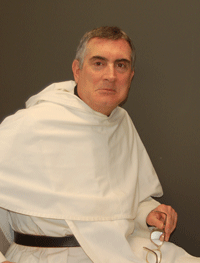Rev. N. Joseph Torchia, O.P., Ph.D.
 Academic Background
Academic Background
The Dominican School of Theology, Washington, D.C.S.T.L., 2001M.Div., 2000The Catholic University of AmericaPh.D. in Early Christian Studies, 1994M.A. in Early Christian Studies, 1992Fordham University, Ph.D. in Philosophy, 1987Villanova University, M.A. in Philosophy, 1980St. Joseph’s University, B.A. in Philosophy, 1975
Graduate Research in Theology at the University of St. Andrews, Scotland, 1975-1977
Sample Courses Taught at Providence College
Philosophy of the Human PersonWisdom of SocratesWisdom of AugustineWisdom of Aquinas Philosophy of ReligionDevelopment of Western Civilization (Honors)
Medieval Philosophy
Teaching Philosophy
As a teacher of Philosophy who is also a Dominican priest, I derive special inspiration from a dictum that has guided the Order of Friars Preachers from its earliest days: to contemplate and to bring the fruits of contemplation to others. This reflects everything I strive to be as a teacher–someone dedicated to the life of the mind and a zeal to share its riches with my students. In my estimation, this level of commitment is vital if the learning experience is to contribute to the educational development of persons with a lifelong hunger for wisdom and an uncompromising passion for truth. In practical terms, I view the classroom experience as a unique opportunity for students to share in the ongoing conversation of Philosophy, as active participants who bring to bear a critical acumen and originality of thought in defending their positions.
Research & Interests
Later Greek and Early Medieval Philosophy; Augustinian studies; Philosophical Anthropology; Bioethics; Philosophy of Science; Patristics; Theology of CreationI view my research as an extension of my life as a teacher. My scholarly growth has moved along two complementary lines: on the one hand, an interest in the development of philosophical anthropology; on the other hand, a delineation of the philosophical background of early Christian thought in its seminal stages of development. More specifically, this investigation addresses the Neoplatonic heritage of the Latin and Greek Fathers of the Church, with a special focus on St. Augustine of Hippo. My scholarship took a new turn during the course of my studies for the priesthood. A summer social justice ministry in Washington and work with the Hawthorne Dominican Sisters at a hospice in lower Manhattan sparked an interest in bioethics. These experiences served as stimuli for a monograph concerning the personhood of cognitively impaired patients. If I perceive a thread that runs throughout my writing, it is an attempt to harmonize the contents of my faith with the data of reason. I am deeply motivated by the challenge of what the theologian Paul Tillich characterized as “standing on the boundary” between faith and reason, and taking the risk of subjecting both dimensions to critical scrutiny. For me, then, the medieval dictum “I believe so that I may understand” is more than a slogan or cliche; it is a rule by which I live. The dominant figures in my own intellectual development (Augustine and Aquinas) are my perennial models in this heuristic endeavor.
Notable Academic Appointments and Awards
Regent of Studies, Dominican Province of St. Joseph.
Editor-in-Chief of The Thomist (2005-2010).Visiting Research Scholar at The School of Philosophy of the Catholic University of America (2007-2008).Coordinator and Seminar Leader, Interdisciplinary Faculty Seminar sponsored by the Center for Teaching Excellence at Providence College, “Being Human” (Spring, 2007).First Place Award by the Catholic Press Association for “Best Feature Article” in the Scholarly Category (2003).Visiting Research Scholar at the Center for Clinical Bioethics of Georgetown University Medical Center under the supervision of Dr. Edmund Pellegrino (Summer, 1999).Andrew W. Mellon Fellow in Graduate Program in Early Christian Studies at The Catholic University of America (1990-1993).
Publication Highlights
Exploring Personhood. An Introduction to the Philosophy of Human Nature (Lanham/Boulder/New York/Toronto/Plymouth, UK: Rowan & Littlefield Publishers, Inc., 2008).”Creation, Finitude, and the Mutable Will: Augustine on the Origin of Moral Evil,” in Irish Theological Quarterly. 71 (February, 2006): 47-66.”Artificial Hydration and Nutrition for the PVS Patient,” The National Catholic Bioethics Quarterly, Vol. 3, No. 4 (Winter, 2003): 719-730.”The Limits of Virtuous Action: Aquinas on the Subjective Conditions of Moral Virtue,” Angelicum 79 (2002): 855-877.”Postmodernism and the Persistent Vegetative State,” The National Catholic Bioethics Quarterly, Vol. 2, No. 2 (Summer, 2002): 257-275.”St. Augustine’s Critique of the Adiaphora: A Key Component of his rebuttal of Stoic Ethics,” Studia Moralia 38 (2000): 165-195.”The Significance of the Moral Concept of Virtue in Saint Augustine’s Ethics,” The Modern Schoolman LXVIII (November, 1990): 1-17.”St. Augustine’s Treatment of Superbia and its Plotinian Heritage,” Augustinian Studies XVIII (1987): 66-79.
Selected Scholarly Presentations and Activities
“Curiositas in the Early Philosophical Writings of Saint Augustine,” presented at the International Congress of Augustinian Studies at Rome, Italy (9/19/86).”The Commune/Proprium Distinction in Saint Augustine’s Early Moral Theory,” presented at the Tenth International Conference on Patristic Studies at Oxford University (August 26, 1987).”The Significance of Ordo in Saint Augustine’s Moral Theory,” presented at the St. Augustine Conference at Marquette University (November 10, 1990).”Theories of Creation in the Second Century Apolgists and their Middle Platonic Background,” presented at the Eleventh International Conference on Patristic Studies at Oxford University (August 22, 1991).”The Significance of the communicatio idiomatum in St. Augustine’s Christology, with special reference to his rebuttal of later Arianism,” presented as a “Master Theme”at the Thirteenth International Conference on Patristic Studies at Oxford University (8/18/99).”Works in Progress” presentation at the Center for Clinical Bioethics at Georgetown University Medical Center entitled “Personhood, Consciousness, and the Moral Status of Permanent Vegetative State Patients: A Critical Assessment of the Postmodernist Response of H. Tristram Engelhardt, Jr. from a Thomistic Perspective” (February 7, 2000).
Philosophy Department
Siena Hall 105
401.865.2335
401.865.1449
wforsley@providence.edu
Rev. N. Joseph Torchia, O.P., Ph.D.
Professor of Philosophy
Siena Hall 119
401.865.1895
jtorchia@providence.edu





